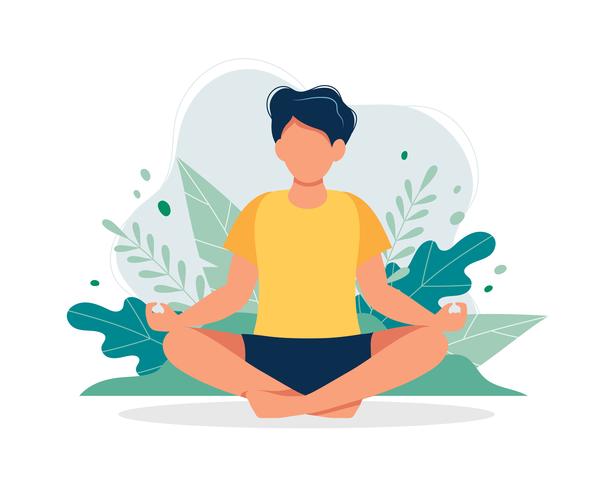The Miracle of Mindfulness

The very first thing that comes to mind when one hears “Mindfulness” is meditation. This is a wrong perception which most of us have. It is true that mindfulness means practicing meditation, focusing on your breath but it is so much more than that, it is not a straightforward concept. Mindfulness means being present in every moment. I know it is easy to say but hard to be done. I came across the concept of Mindfulness when I was going through a hard time in my life, like depression, anxiety and other emotions. I did know the concept of meditation back then, but I have always been fascinated by how the monks or the lamas in The Himalayas meditate. They have a very unique posture sitting in a full lotus position (left leg on the right thigh and right leg on the left thigh), Meditation can be done in many positions like full lotus, half-lotus, seiza, and chair positions. Then, I searched for this position of meditation and I found that it is called “Zazen” or “Zen” meditation. Practicing meditation for over two years now for a half-hour daily has changed my life.
Practicing mindfulness can help anyone achieve self-awareness. Sitting for meditation can be a good initiative but, one has to be consistent with it and by that, I am not saying that one has to do meditation every day. One can take some time out once a week like every Saturday morning or night for half an hour or even an hour. Once you start to feel tired just stop doing the meditation. While meditating one will have a flow of ocean of thoughts and one should not control it, instead, let that thought pass and be aware that a thought has entered my mind and let it pass. If you are lost in the ocean of thoughts, you can bring yourself back to the present moment by slowly focusing back on your breath. Never force yourself on getting back to the present, the more you will force yourself, the more the thoughts will occur so, let that thought pass by.
All it requires is practice. Now, everyone will say that they don’t have time for meditating, so one can do “Intentional Breathing”. To be aware you don’t need to meditate. One can be self-aware by walking, having a shower or doing the dishes or it can be any day to day mundane activities. You might use your steps to measure your breath. The same way you can practice while doing the dishes. Anyone can wash the dishes as fast as possible and enjoy their cup of tea or food afterward. While washing the dishes one should only be washing the dishes, which means that while washing one should completely be aware of the fact that one is washing the dishes. At first, it might seem a little silly: why put so much stress on a simple thing? But that’s precisely the point. The fact that I am standing there and washing the bowls is a wondrous reality. I am completely myself, following my breath, conscious of my presence and conscious of my thoughts and actions. There’s no way I can be tossed around mindlessly like a bottle slapped here and there on the waves. The mind is like a monkey swinging from branch to branch through a forest. In order not to lose sight of the monkey by some sudden movement, we must watch the monkey constantly and even to, be one with it.
Mind contemplating mind is like an object and its shadow – the object cannot shake the shadow off. The two are one. Wherever the mind goes it still lies in the harness of the mind. The Sutra sometimes uses the expression “Bind the monkey” to refer taking hold of your mind. A Sutra is a type of religious literature present in many Asian traditions such as Hinduism, Buddhism and Jainism. The word Sutra is a Sanskrit term that means “discourse”. Sutras are important religious practices, sometimes containing the teachings of the Buddha. But the monkey image is only a means of expression. Once the mind is continually aware of itself, it is no longer a monkey. There are not two minds, one which swings from branch to branch and another which follows after to bind it with a piece of rope.
The person who practices meditation usually hopes to see into his or her own nature in order to obtain awakening. But if you are just beginning, don’t wait to “see into your own nature”. Better yet, don’t wait for anything. In the first couple of months, try to build up your power of concentration, to create an inner calmness and serene joy. You will be able to shake off anxiety, enjoy total rest, and quiet your mind. You will feel refreshed and gain a broader, clearer view of the things, and deepen and strengthen the love in yourself. And you will be able to respond more hopefully to all around you.
Meditation is nourishment for your spirit and body as well. The path from the observation of your mind to seeing into your own nature won’t be too rough. Once you are able to quiet your mind, once your feelings and thoughts no longer disturb you, at that point your mind will begin to dwell in mind. Your mind will take the hold of mind in a wondrous way which no longer differentiates between subject and object. Drinking a cup of tea, the seeming difference between the one who drinks and the tea being drunk evaporates. Drinking a cup of tea becomes a direct and wondrous experience in which the distinction between the subject no longer exists.









